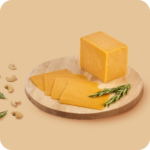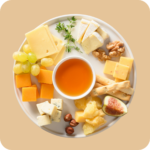The non-dairy cheese market is experiencing rapid growth, driven by the increasing demand for plant-based alternatives. In 2024, 28% of consumers increased their consumption of non-dairy cheese, and product launches in this category are expanding at a significantly faster rate than traditional dairy cheese (+27% vs. +4%).
However, consumer expectations are high. Taste, texture, and nutritional value remain key concerns. Many still perceive vegan cheeses as inferior in terms of protein, calcium, and other essential nutrients compared to dairy-based options.
This creates a dual challenge for food manufacturers: delivering vegan cheese that replicates the sensory qualities of dairy cheese while meeting nutritional expectations. At Biospringer by Lesaffre, we develop yeast-based solutions that improve flavor, texture, functionality and nutritional value in plant-based cheese formulations.
In this article, we will explore the dynamic market of non-dairy cheeses, outline the formulation challenges of vegan cheese and finally introduce Biospringer yeast-based solutions through a step-by step recipe vegan cheddar recipe.
Summary
Find out how to create your own cheddar recipe with Marine
The growing market for non-dairy cheese
The demand for non-dairy cheese is accelerating, particularly in key markets such as the US, Canada, UK, Germany, and France, where sales growth ranges between 10% and 25%. According to Innova’s 2024 data, non-dairy cheese is expected to maintain double-digit growth through 2027.
Health and sustainability are top priorities for today’s consumers. Between 15% and 25% of new vegan cheese product launches include clean-label claims such as “no additives,” “GMO-free,” or “organic”—far exceeding traditional dairy cheese.
Despite this growth, 24% of consumers feel that vegan cheese lacks variety and innovation, presenting a major opportunity for manufacturers who can deliver on taste, texture, and nutritional performance.
Challenges in vegan cheese development
Despite its growth, the non-dairy cheese industry faces several technical challenges.
Taste: A fundamental consumer expectation
Taste remains the number one driver for consumer satisfaction and repeat purchase in cheese alternatives. Many consumers are still disappointed by the flavor profile of vegan cheese, which often lacks the depth, complexity, and characteristic notes found in dairy cheese. Replicating the savory richness, sharpness, or creaminess of traditional cheese—while avoiding unwanted off-notes—is a key challenge for formulators.
Flavor authenticity is essential to winning over both flexitarians and long-time plant-based consumers.


Texture, meltability, and slicing: A technical hurdle
Texture is equally critical, yet often more technically complex to replicate. Traditional dairy cheeses range from soft and creamy to hard and crumbly, each with specific melting, slicing, and mouthfeel properties. Vegan cheese must offer a similar sensory experience—whether that’s smooth spreadability, clean slicing for sandwiches, or the ability to melt and brown in hot applications.
Achieving this functionality with plant-based ingredients requires careful formulation, as many current alternatives lack the elasticity, structure, and performance that consumers associate with dairy cheese.
Nutritional Profile: Meeting Evolving Consumer Demands
Beyond taste and texture, nutrition is a growing priority for consumers. Many plant-based cheeses are perceived as low in protein and lacking essential nutrients such as calcium or vitamin B12. As consumers become more health-conscious, they are actively seeking vegan cheese options with improved protein content, cleaner labels, and fewer artificial additives.
Meeting these expectations without compromising on taste or functionality challenges manufacturers to explore innovative ingredients and formulation strategies.

To succeed, food manufacturers must develop vegan cheese alternatives that excel in taste, texture, and nutrition—a threefold challenge requiring specialized expertise and high-performance ingredients.
Biospringer yeast-based solutions for vegan cheese
At Biospringer by Lesaffre, we offer a complete range of yeast-based ingredients that help formulators create vegan cheeses with authentic taste, appealing texture, and enhanced nutritional value.
Improving taste and flavor in vegan cheese
- Springer® Reveal: Intensifies the overall cheese flavor profile, adding depth and complexity.
- Springer® Umami: Delivers rich umami notes for a lasting savory impact—ideal for mimicking the depth of traditional cheeses.
- Springer® Signature: Offers specific cheese flavor notes to replicate cheddar, gouda, or mozzarella profiles.
These solutions empower formulators to develop vegan cheeses that don’t compromise on authentic dairy-like taste.

Improving texture and nutrition in vegan cheese
- Springer Proteissimo®: Increases protein content while maintaining a clean flavor profile. Ideal for improving meltability and sliceability in hard vegan cheeses.
- Springer® Cocoon: Enhances creaminess and mouthfeel, perfect for soft and creamy vegan cheese varieties.
All our yeast-based ingredients are GMO-free, kosher, and halal-certified, supporting global regulatory compliance and consumer trust.
By combining these solutions with selected starches, proteins, and fermentation techniques, manufacturers can produce premium vegan cheeses with superior melt, slice, and taste characteristics.
Discover our vegan cheddar recipe
Marine, our Food Application Specialist, developed a vegan cheddar recipe that offers:
- A vibrant cheddar-like color
- Smooth meltability in the oven or frying pan
- Excellent sliceability for sandwiches and burgers
Her process includes ingredient selection, formulation strategy, and expert tips to ensure optimal functionality and flavor.

“I was really impressed by the texture as the cheese melted. The slice of vegan cheese becomes golden brown as it cooks—almost like regular milk-based cheese.”
— Marine, Food Application Specialist
Future innovations in the vegan cheese industry
With growing investments in plant-based food technology, the future of non-dairy cheese looks promising.
Key trends include:
- Fermentation-based cheese alternatives that mimic traditional aging processes
- High-protein formulations to meet nutritional expectations
- Sustainable production practices that emphasize ethical sourcing and reduced environmental impact
These innovations will shape the next generation of vegan cheeses—products that are delicious, nutritious, and better for the planet.
Want to replicate Marine’s vegan cheddar success?
Download our exclusive step-by-step recipe!









